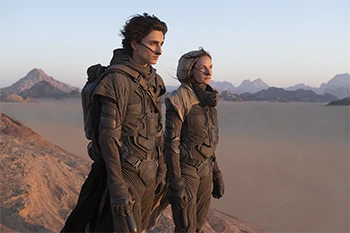After a seemingly endless series of delays and increasingly asinine comments from its director Denis Villeneuve about why Dune positively must be seen in a theatre despite a global pandemic, fatigue has started to seep in even among the most excited would‑be‑moviegoers. It brings me little joy to tell you that Villeneuve was probably right all along. That’s a problem. Dune is one of the most breathtaking cinematic experiences the science fiction genre has offered in the past decade. The cinematography and score are unbelievable. There are shots with the symmetry of Escher and the chiaroscuro of Caravaggio, aerial views that would give astronauts a second overview effect, architecture at a Magrathean scale. Dune shimmers and shakes. Much like Villeneuve’s previous film, it has that exceptional hypnotic quality that seems to suck you in like a sandworm in the desert. You can’t look away.
It’s unclear, however, what this spice‑in‑space epic brings except a theatrical vibe for the ages. Timothée Chalamet, Rebecca Ferguson, and Oscar Isaac do their best to convey an unmistakenly weird source material that was told initially extensively through inner monologue. Their lines are often stilted, which could be an attempt at stylish delivery in line with the nobility this House Atreides is trying to uphold. In other words, all intentional. The plot, in terms of events, translates better to the screen, which unfortunately highlights that it’s remarkably ordinary. There is nothing inherently wrong with that; the epithet “space opera” is often thrown around regarding Dune for a reason. The conflict, bravery, and betrayal seen in many tall tales before just happens to be a very fruitful recipe. But in this case, it’s wrapped in a dazzling symphony of unique sights and sounds. Story gives way to atmosphere. You can’t look away.
Comparing Dune too much with the book it’s adapted from is not a particularly rewarding exercise, by the way. Partly because the two have to diverge by necessity, although going so far – like some – as to call Dune “unadaptable” is an exaggeration. But the better reason to stay away from the comparison is that you’ll discover Villeneuve has made not only some genuinely ignorant claims about moviegoing in the COVID‑19 era but also said awkward things about the film’s relation to the book’s influences from Middle Eastern and North African culture. Like the film critic Hanna Ines Flint so succinctly put it: “He was so faithful to the book and loves MENA culture so much he Arab’d up a white Spaniard to play the leader of the Fremen and invented a new language to replace the Arabic from the text.” This comment referenced an interview with Villeneuve in The Nerds of Color and, of course, ties into a long‑standing discourse on whether Dune – the original by Frank Herbert – is a poorly veiled white saviour narrative drenched in orientalism or if it’s a critique of those very things. Let’s just say some choices this director has made are questionable, regardless of their origin. In his defence, none of those choices seems arbitrary. It’s all a remarkably coherent vision. You can’t look away.
In that sense, Dune really is the work of a visionary. Villeneuve has shown throughout many movies that he deserves this accolade. This grand sci‑fi adventure looks like nothing else, feels like nothing else. It’s mesmerising. But it’s hard to shake the feeling that it’s also only that – a vision. There is virtually zero character development, no real emotional attachment to any of the characters, no newfound perspectives on life. These are not requirements for a great movie experience but might clue us into Villeneuve’s obsession with the theatrical experience. Could it be that when a vision is powerful mostly in terms of image, sound and aura, it needs to be experienced in total immersion? Is the complete takeover of the senses that a 3D/IMAX/Dolby theatre achieves a necessary fundament for grasping Villeneuve’s Dune entirely? He seems to lean that way, with a zeal that was sometimes hard to understand. Now having seen Dune, under the director’s favoured circumstances, I am – again, sadly – inclined to agree. Much joy is probably to be had from this movie at home, but I can’t help thinking something is lost when the immersion goes away.
I’m well aware the idealised theatre experience of sitting down in a comfortable chair in complete silence with only you and your senses is more or less a myth these days. But I also subscribe to the idea of the theatre as a box for concentration, sharpening minds and feelings. Something happens in there. Villeneuve decided to make a movie that ultimately hinges on this something. This fact isn’t why he is in the wrong; it’s that he wants people to risk their lives to see his new movie. He couldn’t have predicted a pandemic, but making something that, in his wish, is so geared towards the theatre will probably ultimately lose parts of the audience. Not only because fewer people can or want to watch Dune that way, but also because Villeneuve has made sure those at home have a lesser experience.
Dune premiered at the Venice Film Festival on September 3, 2021, and will be released in the US on October 22, 2021.

